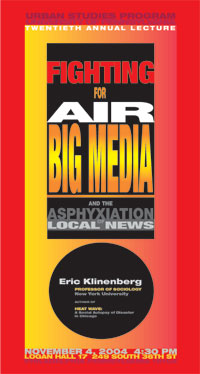Event
20th Annual Public Lecture: Eric Klinenberg
"Fighting for Air: Big Media and the Asphyxiation of Local News"

"Fighting for Air: Big Media and the Asphyxiation of Local News"
Klinenberg is currently an Assistant Professor of Sociology at New York University, a position that he held previously at Northwestern University, located outside of Chicago. He obtained his undergraduate degree from Brown University in the fields of History and Philosophy and received his Ph.D. and his Masters Degrees in Sociology from the University of California at Berkeley.
The fields that Klinenberg is interested in researching include: urban studies, media and cultural production, disaster and social violence, race and theory. Considering himself an urban sociologist, Klinenberg is, “committed to the gritty work of ethnography but motivated by theoretical questions, interpretive challenges, and a passion for public and politically engaged social science.” He used these theories and methods with great success in his first major publication Heat Wave: A Social Autopsy of Disaster in Chicago ( University of Chicago Press, 2002).
Heat Wave tells the story of a weeklong heat wave that resulted in over 700 deaths for the city of Chicago. Klinenberg examines how, in an age of modern cities, so many fatalities could take place. In this book, he illustrates a situation of, “social breakdown, unresponsive government, and poorly equipped public services.”
Much as he did for Heat Wave, Klinenberg is using social science research methods, specifically an ethnographic study, for his current research topic (and the subject of his speech for the Urban Studies Public Lecture) on “culture, technology and knowledge production in three metropolitan news organizations.” Klinenberg became interested in this topic while conducting research for Heat Wave and teaching at Northwestern University. The examination of this tragic event led him to observe how, “city news reporters and major media organizations operate. [He] became embedded inside different newsrooms, and learned firsthand how in the context of new technologies, emerging market pressures, and a dynamic field of cultural production reporters and editors perform their craft.” This topic was so intriguing to Klinenberg that he dedicated a chapter in Heat Wave to the media’s response to this fatal week. Since leaving Northwestern University for New York University, Klinenberg has expanded his research of newsrooms and media outlets to include New York City.
Given the prior critical appeal surrounding Klinenberg’s work, his Urban Studies Lecture should prove to be an entertaining and interesting examination of the media in this time of fast-paced technology change.
